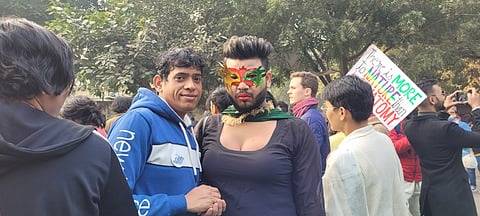
New Delhi— In a slight setback to the hopes of the transgender community, that has been pressing for horizontal reservation for long , the Supreme Court on Monday declined to entertain an application , that sought clarification on the NALSA verdict passed in 2014, regarding reservation.
The bench led by Chief Justice of India DY Chandrachud said that the court is not inclined to entertain the application in a disposed off proceedings.
However, the court held that the applicant would be at liberty to pursue such remedies as are independently available in law.
The application was filed by Grace Bhanu, a transgender rights activist who had sought for the court's intervention to clarify whether the reservation granted to the transgender people in the NALSA judgement 2014, is a horizontal reservation. Advocate Jayana Kothari represented the applicant.
The applicant emphasized that the Supreme Court had ordered the Union and the states to treat transgender people as a socially and educationally disadvantaged class and to give them preference in education and public employment in the case of the National Legal Services Authority Vs. Union of India.
The court did not, however, specify how the reservation should be put into practice. The applicant claimed that many states had not yet implemented such reservations as a result.
The petitioner submitted in the application that the NALSA decision conveys the idea that transgender people should be recognized as members of the OBC class, meaning their evaluation will be vertical. There will be a number of issues if the transgender reservation is viewed as a vertical reservation.
The applicant outlined a few problems such as a transgender person who falls within the SC/ST category will have to pick whether to use their OBC or SC/ST quota. If such people choose the SC/ST quota, they will forfeit the transgender quota's advantages and will be forced to compete with those in the SC/ST category, which will disadvantage them lastly such individuals will not be eligible for further affirmative action benefits if they currently fall under the OBC category.
The petitioner stated that granting reservations on the basis of gender and disability, as has been done in the case of women and people with disabilities, is the most effective approach to accommodate transgender and intersex people.
According to the application, a cabinet note was moved by the Ministry of Social Justice in September 2021 to include transgender people in the OBC category. The Tamil Nadu government has chosen to classify them as belonging to the Most Backward Class. Presently, Karnataka is the only state to have granted them 1% of the horizontal reservation.
The application also pleaded reservations for transgender people to include age and cutoff point concessions.
The following reliefs were requested in the application:
Clarify or amend the ruling that the reservations intended for transgender people are horizontal reservations, which was made in the Writ Petition (Civil) No. 400 of 2012 judgement of April 15, 2014:
Modify the ruling from the Writ Petition (Civil) No. 400 of 2012, which said that reservations for transgender people should also include concessions in age, cut-off scores, and physical requirements, the same as offered to other reserved categories;
Explicitly state or alter the ruling dated April 15, 2014, in Writ Petition (Civil) No. 400 of 2012 that transgender people should be given a reservation in addition to public employment and public education as well as in the allocation of housing sites, schemes, and in local authorities.
The Mooknayak reached out to the petitioner Grace Banu to know her next move . Grace Banu said, “ The court's order was expected. In the NALSA judgement , they used all the positive words and ordered in favor of the transgender community, but due to lack of clarity, the transpeople are put under vertical reservation. This is the reason, why we filed an application in the Supreme Court and demanded intervention. Now , we will file a separate petition". However , the activist said that the only problem is, that the judicial proceedings usually take a long time and the wait would be harrowing for the unemployed trans individuals.
“Last year Tamil Nadu Public Service Commission (TNPSC) Group 4 examination was held in Tamil Nadu, and results for the same were out a few days back. Many trans persons wrote the examination and some got good marks but they were denied selection since as there was no provision for separate reservation. In Tamil Nadu, the trans people are put under Most Backward Class, and have no separate reservation in the same class,” Grace Banu said. She further added that the NALSA verdict has just included one gender to the list regardless of what benefits they’ll get after it, which is completely unjust and we are going to fight against this system as we have our rights in the constitution.”
Meanwhile, the transgender community in Delhi plans to organise a peaceful protest march from Rajghat to Rashtrapati Bhawan on Ambedkar Jayanti , in support of their demand for horizontal reservation.
You can also join our WhatsApp group to get premium and selected news of The Mooknayak on WhatsApp. Click here to join the WhatsApp group.